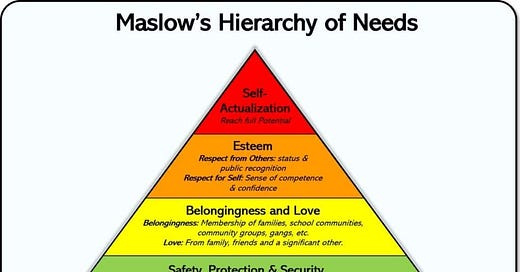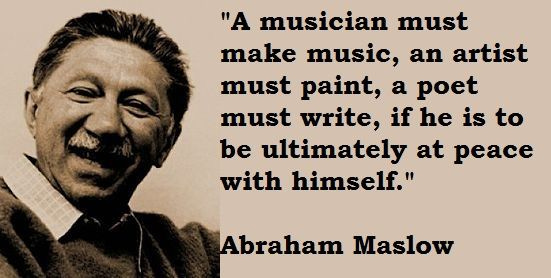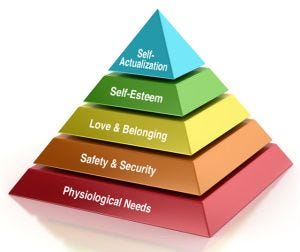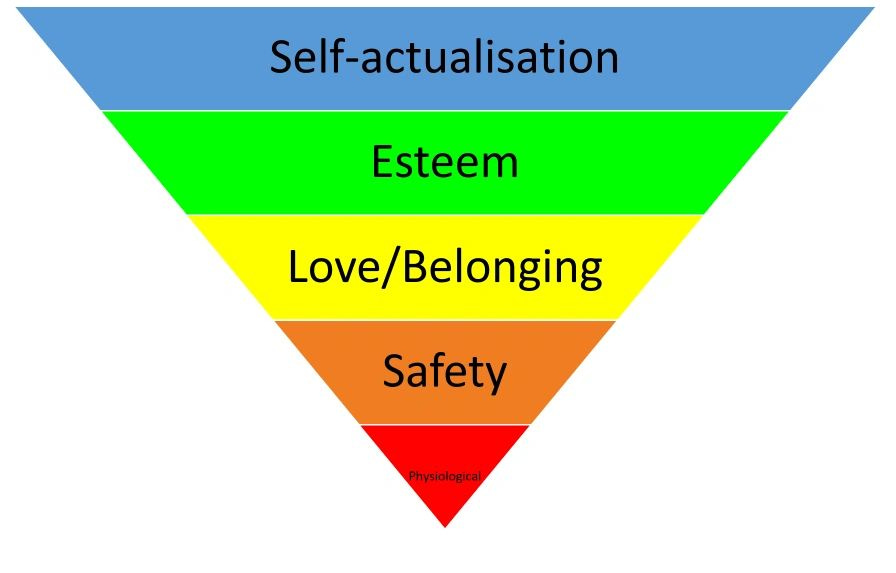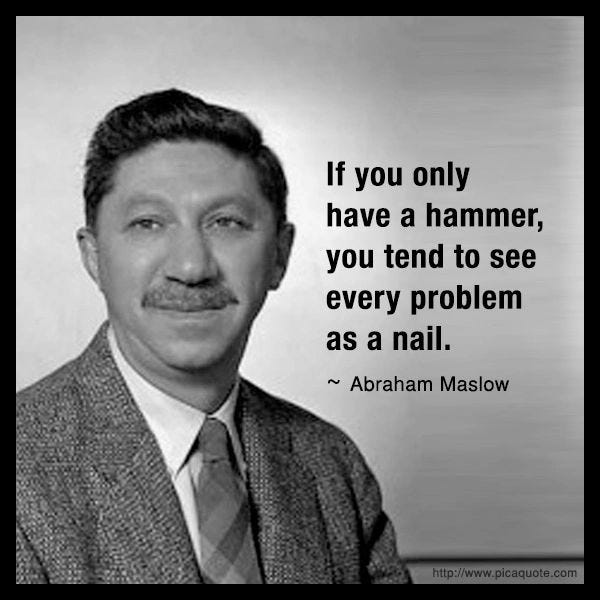When you are engaging in and/or teaching your craft, what’s the underlying motivation behind it?
What human needs are you satisfying?
Have you ever thought of your work in the context of how it fits within a hierarchy of human needs?
Maslow's Hierarchy of Needs:
The above graphic is by American psychologist Abraham Harold Maslow (1908-1970), and his "Hierarchy of Needs." It’s the result of a theory on psychological health he devised based on the ranked order of human needs and their psychological motivation.
The theory first appeared in his 1943 paper "A Theory of Human Motivation" in Psychological Review. Feel free to watch the video below explaining the theory in an easy-to-understand matter:
OK...now what does this have to do with being a "Lucrative Artist”?
Good question! Let me start with a caveat. What I’ll talk about in this post isn’t going to be a perfectly and equally applicable to all circumstances and scenarios. So try to avoid getting your mind stuck on specific examples that may invalidate what can otherwise be a very valid point or perspective for many circumstances, especially for the circumstances where we want to create a permission structure for ourselves to virtuously command the lucrative futures we desire and deserve helping those we’re most meant to serve.
So with that in mind, consider this question:
From what level on the pyramid comes the intrinsic motivation behind your work as an artist or teacher of your art form?
Physiological Needs and Safety and Security Levels
Are you a literal "starving artist" struggling to get by, and you’re just doing any work you can just to eat and keep a safe roof over your head to stay alive?
Because these essential needs must be met, are you working in a job you don't want Are you singing a song you don't want to sing? Are you engaging in some other "art" or line or work that is not authentic to the true artist within you?
Love & Belonging
Is the work you are currently doing just for the sake of maintaining relationships and/or your sense of belonging with others?
Perhaps might you be in a show not because you actually want to be in it, but because your friends or peers are in it? Or because it serves some other relationship that could serve other objectives later on? (My previous post touches on this!)
Self-Esteem
Are you doing it just because it makes you feel good or you get approved by others? Are you performing a role for the sake of just being able to say you did it, or because you love the spotlight? Perhaps you worked really hard on your technique or on some specific repertoire and you deserve to showcase your hard work and be recognized by others for it?
OR is it “Self-Actualization”?
Are you fulfilling your greatest and most authentic desires and achieving your fullest potential? Are you carrying out your life with your own self-designed purpose? Maybe you’re even living with an immense sense of abundance because you’ve become the most of all you can be in all the ways you really wish to be using the totality of your agency?
Or to put it another way, are you singing what you truly want to sing when, where, how and for whom you would really want to sing it?
And if you’re a teacher or mentor, do your teaching goals and desires closely align with your students' or clients' learning goals and desires?
If you answered “no” in full or in part to any of the above questions, what if “yes” could be more possible than you might think? What would have to be different to make that possible to contemplate?

The Hierarchy of Needs and the Artistic Career
Theoretically, according to the hierarchy, you need financial security before you can afford self-actualization—unless you can hunt your own food and build your own shelter without any money!
As
, owner and voice teacher of the Petersen Voice Studio in Watertown, Massachusetts wrote in his blog:“When we start out as young musicians and artists, we have spent a great deal of time in the highest point of the pyramid (Self-Actualization) because we’ve had the benefit of parents or academia to provide the lower levels of Maslow’s hierarchy.”
Many of us who are fortunate to be able to pursue careers in the arts have been blessed with childhoods, college experiences, or other study periods where most or enough of our lower levels of need were already adequately met. We were afforded many opportunities to regularly self-actualize and freely explore or refine our greatest joys, passions, and most importantly, our truest sense of self. My own childhood and college years were a textbook example.
Explaining this further, Justin Petersen wrote: “For many artists, our pyramid is inverted. We spend a lot of time trying to get respect for our work and self-actualization while leaving other lower levels out of the equation.”
As I and my peers learned later in life, when it was time to move away from studying and having to get into the “real world” of pursuing a career and making an actual living, parents and financial aid packages are no longer footing the bill! So many aspiring artists are suddenly faced with a brand new set of needs. (Hence, I wrote last year about how clients fresh out of college can be challenging clients for our own bank accounts!)
Self-actualization ends up taking a back seat as we learn "adulting" on the fly. We can easily lose our sense of self when we find ourselves feeling desperate as we struggle to earn enough to even survive.
But not only do I agree with Justin Peterson, I'd like to make a case that it’s a more possible for artists and other passion-driven professionals to find ways to successfully carry out their vocations and make a lucrative living as if the pyramid of needs is indeed fully inverted.
The Habit of Indecision
For many of us in the arts and humanities, rather than do what we truly most want to do, which I believe on some level we’re divinely meant to do, we often fall into a trap of taking on any kind of artistic work we can get.
Many will find themselves with work that may pay an insufficient wage, may be a toxic environment, and/or may include some other attribute demonstrating a lack of honor and respect. It’s easy to get into situations where the authentic artist within is languishing for a chance at recognition.
Much of this can partly be due to a common habit of indecision, particularly after graduating from college or grad school. For many of us, it can feel like we were only taught us to just be perfect, and then we’ll get “picked” for a career as if we’re not supposed to do anything else other than hope and wait. And so we end up allowing others to tell us too much of what to do and essentially make our career decisions for us.
As Napoleon Hill wrote in Think and Grow Rich, “Generally, the youth just out of school seeks any job that can be found. He takes the first place he finds, because he has fallen into the habit of INDECISION.”
Sometimes the work artists take on is literally just for the sake of being able to earn enough sustenance to stay alive. Other times, it can be for the sake of maintaining some kind of unrealistic validation by the outside world. We may worry about others judging our realistically imperfect resumes, whether it’s the gaps, the inconsistency, the diversity of experience, the non-linear career progression, or something else that makes us too unique. We often try to please those who go about life doing all they can to maintain certain standards of conformity, no matter how fictitious their origination.
Earl Nightingale put it best when he said, "The opposite of courage in our society is not cowardice, but it is conformity."
Money and the Maslow Theory
What if your income from your artistry, teaching, and/or other related service could be at an even higher level if you're fulfilling a higher level of need for both you and the client?
Most people view financial security as simply meeting the basic lower needs on Maslow’s pyramid to cover survival and safety. However, when you engage in work that truly satisfies your higher-level needs—those of creativity, purpose, and self-fulfillment—you can unlock a whole new dimension of value creation.
This perspective can transform your work from a mere transactional experience into a transformational experience benefitting both you and your clients. When you operate from a level of self-actualization, what may seem like natural talent is actually a signal that you’re operating at the peak of your potential, positioning you to command fees that are higher than you’d expect.
In this elevated space, your service is no longer about scraping by; it’s about delivering profound impact. Consider the master teacher or premier artist whose work transcends technical skill. Their ability to inspire, empower, and transform lives beyond the offering alone is what makes their work priceless. Clients who are also seeking higher fulfillment understand such experiences are worth investing in. They aren’t merely buying a transactional service; they’re investing in a transformational relationship that enriches their lives, fosters growth, and ultimately helps them reach their own self-actualization.
On the other hand, when you’re operating in survival mode—struggling for income and meeting only the most basic needs—the dynamic shifts drastically. A scarcity mindset not only limits your ability to recognize your own value, but it also tends to attract clients who are equally constrained by their financial challenges. In these circumstances, you may feel compelled to accept lower fees; clients facing their own struggles are less likely to invest in premium services no matter how much you can help them. This mutual focus on survival leads to a race to the bottom, where neither party truly benefits from the full potential of what the relationship could offer, even if it’s possible for each side to theoretically help the other’s business.
When both you and your clients are aligned in a pursuit of abundance and self-actualization, the entire relationship can expand. Your expertise, creativity, and dedication become evident, justifying higher pricing while encouraging clients to see the value in further investing in themselves. Over time, these relationships can deepen further—a regular client might grow into a new kind of mentor, or even a collaborative partner—creating new opportunities for growth and deeper value exchange.
Ultimately, by aligning your work with your highest potential and seeking to serve those who are similarly committed to their personal and professional growth, you’re creating an ecosystem where abundance begets abundance. This not only enables you to command premium pricing with confidence, but it also transforms every interaction into a mutually enriching journey.
"If you deliberately plan to be less than you are capable of being, then I warn you that you'll be unhappy for the rest of your lives. You'll be evading your own capacities, your own possibilities."
-Dr. A. Maslow
So are you ready to self-actualize?
As Justin Petersen indicated, I too believe it's possible to essentially have this pyramid flipped over while still having all of our needs met when we are fulfilling our most authentic desires and doing all we are meant to do.
A desire to help others in this regard helped lead me to finding The Lucrative Artist and devise offerings to help other artists and entrepreneurs to create more fulfilling and lucrative work opportunities for themselves and those they most passionately wish to serve.
Are you interested in figuring out how you can earn more doing more of what you truly want to do serving those you truly want to serve?
Do you need help figuring out how you can apply your talents, experience, and expertise into new offerings of higher artistry and/or higher learning so you are not only self-actualizing in your work, but you are also able to better help others self-actualize with you?
To quote Nightingale, "We don't have to compete; all we have to do is create." And The Lucrative Artist is here to help you figure out what you really should create.
Coontact me if you'd like to schedule a chat to see if my offerings might be a good fit for you. At the very least, you'll get some further insight into how you might move forward, regardless of whether or not this is the right program for you at this time. You don't have to go about self-actualizing all alone!
Thanks for reading.

